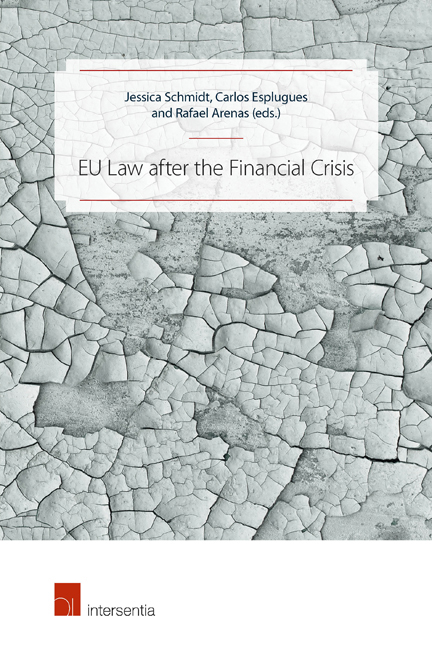Book contents
- Frontmatter
- Contents
- List of Abbreviations
- List of Authors
- Introduction
- PART I RESCUE MECHANISMS AND MONETARY POLICY
- The Interplay Between EU Law and International Law to Set Up the Eurozone Rescue Mechanisms
- Monetary Policy and Private Pensions
- PART II THE IMPACT OF THE FINANCIAL CRISIS ON THE BANKING SECTOR AND CAPITAL MARKETS
- PART III THE FINANCIAL CRISIS AND TAX LAW
- PART IV THE FINANCIAL CRISIS, CONSUMERS AND CONSUMER LAW
- PART V THE FINANCIAL CRISIS AND COMPETITION LAW
- PART VI THE FINANCIAL CRISIS, RESTRUCTURING AND INSOLVENCY LAW
- PART VII THE SOCIAL DIMENSION OF THE FINANCIAL CRISIS AND EU CITIZENSHIP
- PART VIII REFLECTIONS ON THE IMPACT OF THE FINANCIAL CRISIS ON THE GENERAL EUROPEAN LEGAL FRAMEWORK AND THE FUNDAMENTAL “EUROPEAN IDEA”
The Interplay Between EU Law and International Law to Set Up the Eurozone Rescue Mechanisms
from PART I - RESCUE MECHANISMS AND MONETARY POLICY
Published online by Cambridge University Press: 13 December 2017
- Frontmatter
- Contents
- List of Abbreviations
- List of Authors
- Introduction
- PART I RESCUE MECHANISMS AND MONETARY POLICY
- The Interplay Between EU Law and International Law to Set Up the Eurozone Rescue Mechanisms
- Monetary Policy and Private Pensions
- PART II THE IMPACT OF THE FINANCIAL CRISIS ON THE BANKING SECTOR AND CAPITAL MARKETS
- PART III THE FINANCIAL CRISIS AND TAX LAW
- PART IV THE FINANCIAL CRISIS, CONSUMERS AND CONSUMER LAW
- PART V THE FINANCIAL CRISIS AND COMPETITION LAW
- PART VI THE FINANCIAL CRISIS, RESTRUCTURING AND INSOLVENCY LAW
- PART VII THE SOCIAL DIMENSION OF THE FINANCIAL CRISIS AND EU CITIZENSHIP
- PART VIII REFLECTIONS ON THE IMPACT OF THE FINANCIAL CRISIS ON THE GENERAL EUROPEAN LEGAL FRAMEWORK AND THE FUNDAMENTAL “EUROPEAN IDEA”
Summary
INTRODUCTION: A BODY OF LAW IN THE MAKING AGAINST AN AMBIVALENT FRAMEWORK
This chapter deals with a new form of international financial law: Eurozone rescue mechanisms. This regime stems from the financial assistance granted to Greece, Ireland, Portugal, Spain and Cyprus. To cope with the European debt crisis, this innovative body of law is being developed by different groups of EU Member States together with the EU institutions. The end product of the process may be either synthesis or fragmentation of the existing legal framework.
The following review is by no means a complete one because it does not discuss the law relating to financial market regulation and supervision, i.e. the European banking union.
However, the legal responses to the crisis are very interesting from an international law perspective. Firstly, there is the characterisation of the obligations set out in the agreements on pooled bilateral loans for Greece: are they international law obligations, or rather contracts subject to national law? These instruments set a certain pattern for other agreements to follow, under the mechanisms relating to Ireland, Portugal, Spain and Cyprus. Secondly, there is the role played by the European Financial Stability Facility (EFSF) as a public limited liability company incorporated in Luxembourg, which was also a party to an interstate agreement. Thirdly, there is the legal nature of the Memorandum of Understanding (MOU) established in Article 2(1) of the 2010 EFSF Framework Agreement (such as Spain's MOU on financial sector policy conditionality), as well as the MOU set out in Article 13 of the European Stability Mechanism (ESM) Treaty.
EU law interacts with international law. It must be taken into account that the set of European arrangements concluded between the Member States to face the financial crisis are subject to the CJEU's jurisdiction in accordance with Article 273 TFEU. In fact, the CJEU rendered a pragmatic judgment on 27 November 2012 in the Pringle case, which upheld the establishment of a stability mechanism for Member States whose currency is the euro.
- Type
- Chapter
- Information
- EU Law after the Financial Crisis , pp. 5 - 24Publisher: IntersentiaPrint publication year: 2016



